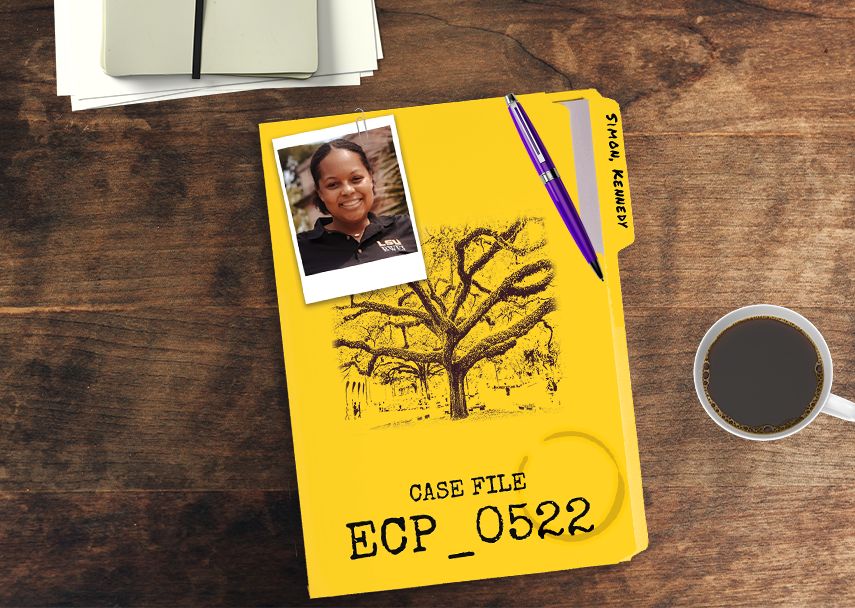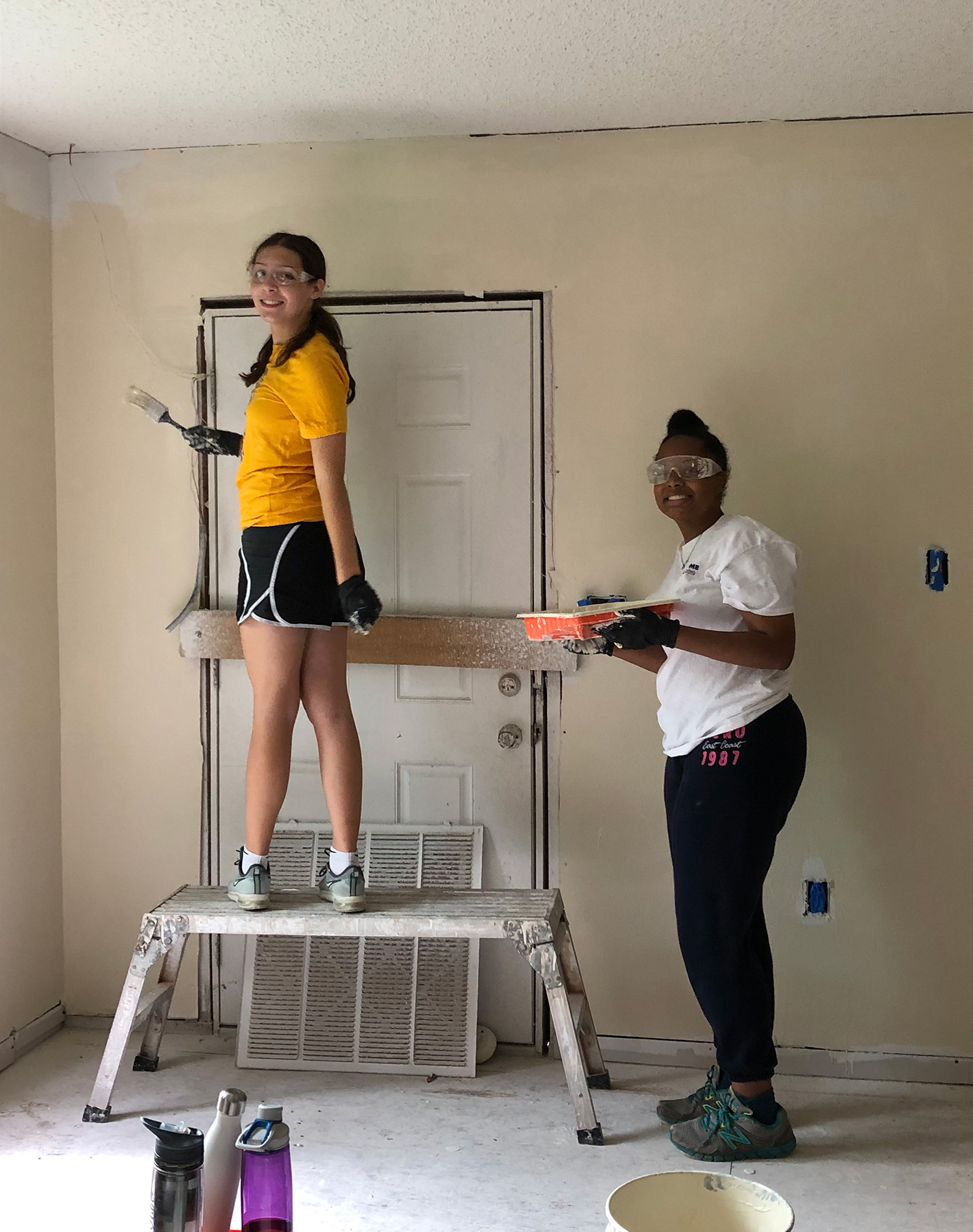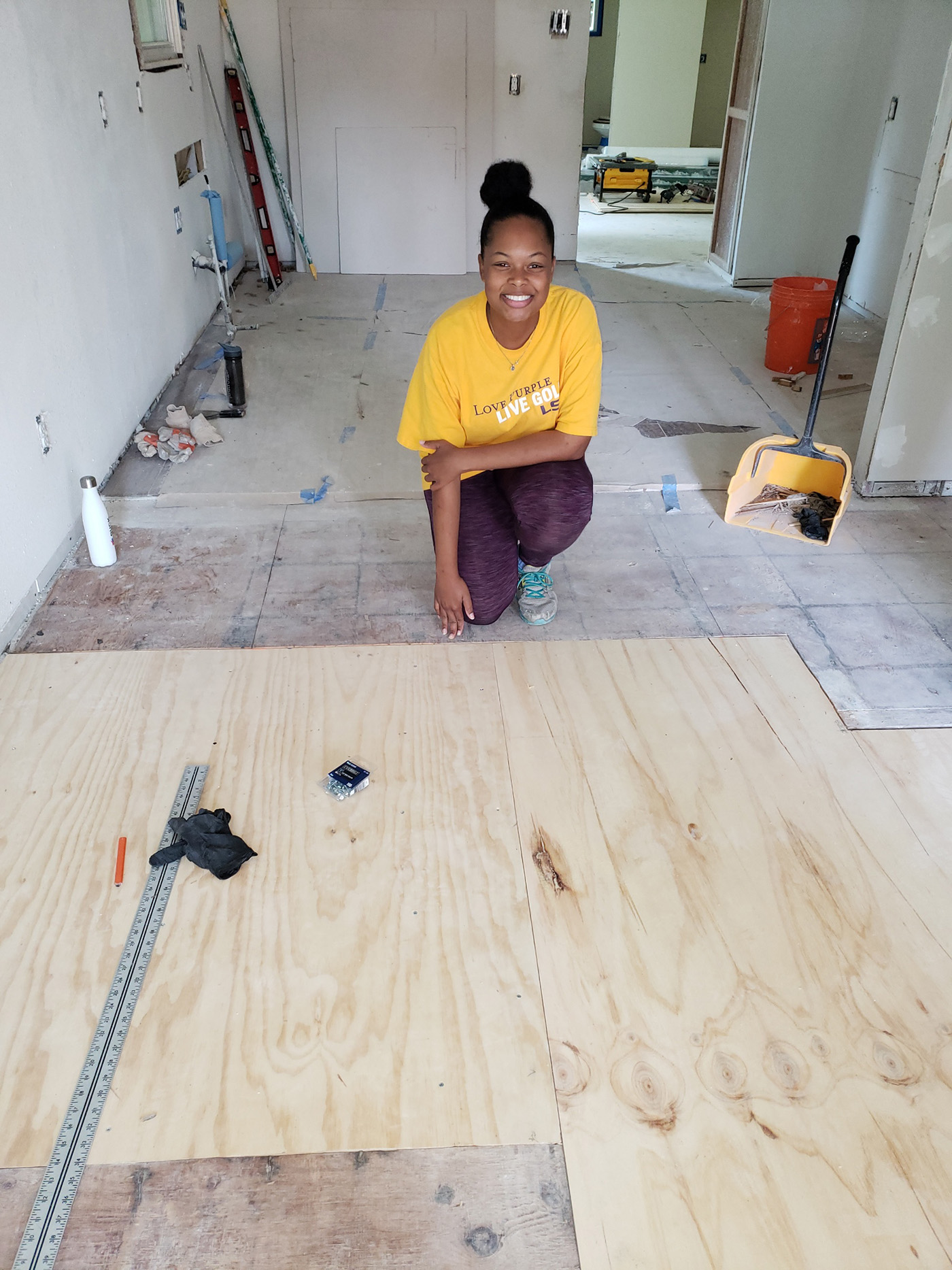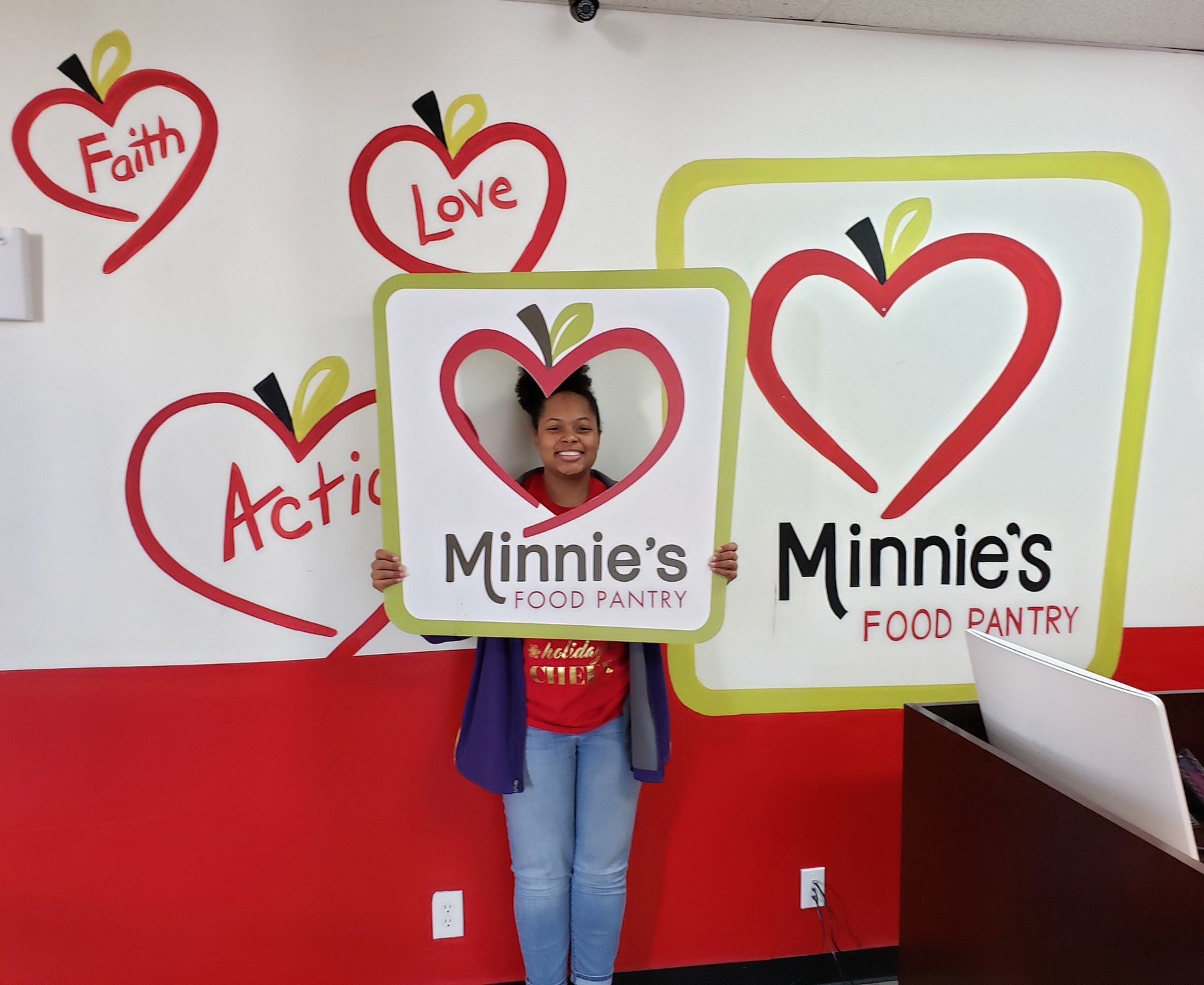ECP Service Dossier Spotlight Series: Kennedy Simon, Spring 2022

CCELL: In your own words, what is an Engaged Citizen?
Kennedy: I think an engaged citizen is someone that wants more for others, and they want to do more for their community. An engaged citizen is someone who sees an issue and is ready to attack anything head on, and wants to really make the world a better place for other people. An engaged citizen is someone that sees problems and issues that are going on in their community and want to actively make a difference.

Kennedy, along with a friend, volunteers with the St. Bernard Project, a nonprofit organization that is dedicated to disaster relief in Louisiana. Since 2006, St. Bernard Project has rebuilt homes for more than 2,140 families with the help of more than 130,000 volunteers.Photo Credit: Kennedy Simon
C: How did you get started working with the Engaged Citizens Program?
K: I heard about the program in my freshman year, and I forgot about it. It slipped my mind. [CCELL Program Coordinator] Grace [Moody] reached out to me to finish completing the requirements, because I guess I had signed up for it! I didn't know I could continue this program with my degree, because I didn't think that there were enough classes I could take in the program for me to finish it. [Grace] told me you can service-option courses, so I was able to do that for some of them. So, it really just kind of worked out! Had she not reached out to me, I don't know if I would have been able to complete the program. I'm really, really glad that [Grace] saw my name in the system and emailed me!
C: How did you first get involved with volunteering and service?
K: Growing up, service was a big part of my life. It started at a young age, from my school environment and my church environment. I was really involved in the Catholic Church […] I would volunteer at the art museum in my hometown, working with children doing different art activities that they would hold over the summer. This continued during high school, which was really big on service. We would have service days where we got involved in the community. [Service] just became a part of my life. There wasn't a time on the weekends, where I wasn't at a food bank, or at the art museum. […] And I enjoyed it, because I like working with people. [Service] became a part of who I am. And then I saw how big LSU was on service, which is one of the reasons why I decided to come here.

Kennedy volunteers with the St. Bernard Project, a nonprofit organization that is dedicated to disaster relief in Louisiana. St. Bernard Project focuses specifically on emergency aid following hurricanes and other major natural disasters. Photo Submitted by Kennedy Simon
C: What do you enjoy most about volunteering?
K: I really enjoy getting to meet other people and hearing their stories. I've met people from different countries and from different areas within the state. [By serving,] you just get to learn more about people. I want to be an attorney; I want to go to law school. So, part of that is because I do want to work with other people. Hearing what they’ve been through and what has led them to where they are today is why I enjoy volunteering.
C: How did COVID-19 impact your service and did you have to adjust your service in the community because of COVID-19?
K: When COVID happened, I went back home in March 2020. Everything went virtual, even my job. So, when I made it home to Texas, I was still able to volunteer at the museum in my hometown and one of the local food banks, the Southeast Texas Food Bank. What they really stressed was wearing your mask and social distancing. So, it was hard because you want to keep everyone safe, especially children and older people. I was cognizant of people that I was around. Also, I had family members and friends that had underlying health issues, so I just tried to be as safe as possible. That really changed how I looked at things; I know now that if I don't feel well or okay, I should stay home instead of volunteering at this site. [The pandemic] made you think more about others, and how you should always put people first.
C: What have you learned about the community that you serve, as they responded to the COVID-19 pandemic?
K: I've learned that volunteer sites know how to adapt. For example, the food bank in my hometown, they were clear with what we needed to do and the precautions we needed to take. I learned how [volunteer sites] can mold and shift to ways that they can still help the community, which I think is huge. I volunteered with Volunteers In Public (VIPS) schools in 2020. I couldn't go into the schools because of COVID. [VIPS] switched everything online, but I still could be reading a book to a child virtually. Working with VIPS showed me that they're really committed to their students, and they're really committed to education. It just shows that a lot of these community partners, they not only talk the talk, I guess you could say they walk the walk.
C: Why did you choose to take service-learning classes—since your psychology curriculum does not require it?
K: I chose to take service-learning classes, because it gives you the opportunity to take what you absorb in the classroom and actually put it into use. Sometimes you'll be in class and kind of think, “How can I actually use this to help other people?” Whereas for me, I served and I learned. I [optioned to] volunteer at Connections for Life, which helps rehabilitate women who have been formerly incarcerated. I was able to take things that I learned in that course and apply to the volunteer site that I worked at. I was able to put words into actions. [By taking service-learning courses], you can actually use the knowledge that you gain in your service learning course, and put it to helping someone in the community.

Simon posing for a photo booth picture at an event to celebrate Minnie’s Food Pantry’s work in various communities in Texas. Minnie's Food Pantry has four locations across three states, which include New York and Pennsylvania.Photo Submitted by Kennedy Simon.
C: What did you enjoy about your contract-option experience?
I really enjoyed my Women and Gender Studies course, WGS 2500, and going into Connections for Life. I really enjoyed working with the director and the managers that were there. I enjoyed listening to him telling me about the criminal justice system. I remember a story where I was speaking to one of the managers there, Miss Judy, and she was telling me about her experiences with Hurricane Katrina. (I'm actually I'm doing my Honors thesis on how black women were impacted by that hurricane.) She was just telling me how she was in St. Gabriel's prison, which is one of the local women's prisons here, during Katrina and how everybody was really, really worried. They would pray. And she was saying how they also made sandwiches for some of the people that had evacuated, the ones that came and stayed there. The stories like that stick with me, because it showed that sometimes community is all you have.
When Hurricane Katrina happened, I think other people might say, “Well, why didn't you leave,” or “You could have left.” But, we also have to [consider] access and resources. Not everybody has the resources to just pick up and leave. People have jobs, have family, and most people really rely on public transportation, so they don't have a car. It's not easy to just say “I can pick up my stuff and leave.” So that was a story that really, really stuck with me. Also speaking with the director of Connections for Life, Miss Karen, she was telling me about her experience with a local prison during COVID. I can't remember the name of the prison, but she was talking about mental health within the criminal justice system. She was explaining how she remembered the beds were really close together, and how this close confinement can cause problems, especially mental health problems. That was another story that really stuck out to me.
Connections for Life has really done an exceptional job for a very long time working with many women in the state and in the community to put their lives back together. They're one of the few transition programs in the state.
C: Do you think you will continue to implement service learning and volunteering in your future?
K: Yes, I would love to. I graduate this May, but even as I go into my career I want to keep volunteering. Even in law school, there are opportunities for people to continue doing service. I would like to find a form of service where I could take what I'm learning in law school and actually invest that work into a clinic as well doing pro bono work..
C: What would you say to incoming LSU students to inspire them to participate in service learning?
K: Well, I would say take advantage of opportunities. The really cool thing about LSU is programs like the Engaged Citizens Program that serve as an opportunity where you can learn more about yourself and learn more about the community. I'm not from Louisiana; I was born in Alexandria, but I grew up in Beaumont, Texas. So, coming to Baton Rouge, I wasn't aware of a lot of things that are going on in the community, and I wanted to be able to connect. The Engaged Citizen Program exposed me to service in the community and issues that I now look at more.